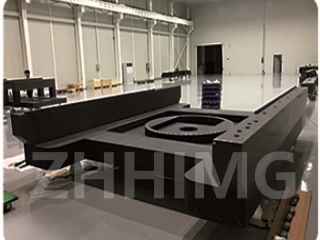Precision granite components are widely used in various industries, including aerospace, automotive, electronics, and manufacturing. They are in high demand because of their exceptional durability, stability, and ability to withstand extreme temperatures. These specialized granite components are an essential part of many crucial processes, and their manufacturing requires high precision. The density of precision granite components plays a vital role in determining their structural integrity and their ability to withstand pressure during operation.
The density range of precision granite components varies based on their specific application. Generally, precision granite components have a density ranging from 2.5 g/cm3 to 3.0 g/cm3. The granite material used for making these components is typically selected based on its physical properties, such as compressive strength, hardness, and thermal stability. The density range is determined by the specific granite material properties and the manufacturing process used to create the component.
Granite is a natural material that is composed mainly of quartz, feldspar, and mica. The combination of these minerals gives granite its unique properties, including its high density, strength, and durability. The manufacturing process used to create precision granite components involves cutting, milling, and polishing the granite material to the required dimensions. During the manufacturing process, the density of the granite material can be altered by adding or removing material in specific areas to achieve the desired weight and thickness.
The density range of precision granite components is critical because it determines their structural integrity and ability to withstand pressure. High-density granite components are more durable and can withstand higher pressures than lower density components. Manufacturers use various methods to test the density of the granite components, including hydrostatic weighing, Archimedes' principle, and mass spectrometry.
In addition to their density, precision granite components are also known for their exceptional stability. Granite is an excellent thermal insulator, which means that it does not expand or contract significantly in response to temperature changes. This makes it ideal for use in applications that require high stability, such as precision measurement tools and industrial machinery. The high stability of precision granite components allows them to maintain their shape and performance over time, leading to increased accuracy and productivity.
In conclusion, the density range of precision granite components is an essential factor that determines their structural integrity and ability to withstand pressure. These components are manufactured using high-quality granite materials that are selected based on their physical properties and then cut, milled, and polished to the required dimensions. The density of precision granite components typically ranges from 2.5 g/cm3 to 3.0 g/cm3. These components are widely used in various industries, including aerospace, automotive, electronics, and manufacturing, and are known for their exceptional durability, stability, and ability to withstand extreme temperatures.
Post time: Mar-12-2024

